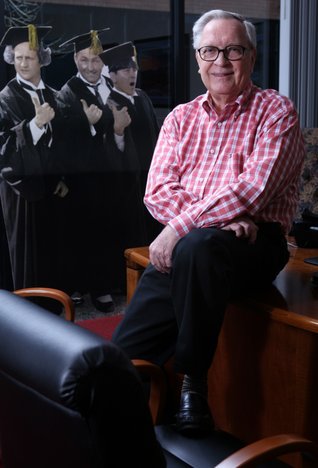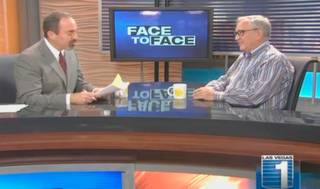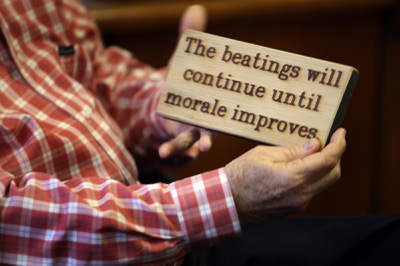
Jim Rogers will step down as Nevada’s leader and chief advocate of higher education in six months. The Three Stooges cutout in his office was a gift from Toni Massaro, dean of the University of Arizona’s James E. Rogers College of Law.
Monday, Dec. 29, 2008 | 2 a.m.
Face to Face: The Rogers Plan

Viewing video requires the latest version of Adobe's Flash Player
Sun Archives
In April 2007, the chancellor of the state’s public higher education system went on public radio to promote the establishment of corporate income taxes in Nevada.
The idea seemed outlandish at the time. Chatting later at a Carson City coffee shop, Jim Rogers conceded that few legislators would take the suggestion seriously.
“It’s going to have to damn near be a tragedy for anything to change,” he said. “The fire rules don’t get made till the building burns down.”
The blunt assessment was typical of Rogers, one of the country’s most unconventional chancellors. For years, the multimillionaire businessman has been pushing for more funding for higher education, calling public colleges and universities “mediocre” and exhorting the Legislature and philanthropists to shovel more money into the system.
So it comes as no surprise that Rogers is leading the fight against state budget cuts — and for new taxes. Today’s struggle is just an extension of a battle he started long ago.
At stake is his legacy.
In 4 1/2 years as chancellor, Rogers has left other higher education officials to grapple with bread-and-butter problems such as poor graduation rates and financial aid — areas that, perhaps consequently, have not improved much under his watch.
Instead, he devoted himself, with mixed results, to a bigger-picture issue: finding new money for higher education.
His crowning achievement, in that regard, is the creation of the “health sciences system,” a fledgling initiative to increase productivity of health sciences programs across the state by pushing them to share space and resources and otherwise coordinate their activities.
Lawmakers agreed in 2007 to back the effort, committing $88.7 million toward building and renovating facilities on the condition that higher education officials deliver $38.7 million in nonstate money to match Nevada’s contribution.
A major budget cut would jeopardize the project, telegraphing to prospective donors that the state is no longer interested in the investment. Legislators have taken back, at least temporarily, $65.5 million of the amount they gave.
So with six months left before his scheduled resignation, Rogers is still playing the evangelist.
Since late spring, he has issued weekly memos expounding on the importance of education, persuading lawmakers and businesspeople to draft letters doing the same.
Top Democrats and Republicans in the state Assembly and Senate participated. Barrick Gold Corp.’s U.S. vice president of public affairs wrote in support of the broad-based business tax Rogers wants.
But getting what he wants will not be easy.
Opposition to taxes has been fierce in Nevada. Opponents argue that a corporate income tax or other broad-based business tax would hurt the state’s ability to attract new businesses and diversify its economy — a particularly nasty prospect at a time when the state’s major industries are struggling.
With Democrats now controlling both houses of Nevada’s Legislature, some of the once-outrageous ideas the chancellor pitched are suddenly plausible.
Rogers’ figurative building — the state budget — is burning down.
A personal income tax is still out of the question. But with projections showing state budget cuts reaching 34 percent without new revenue, a new corporate levy could be on the table.
With many legislators saying education, health and human services and public safety cannot take 34 percent cuts, a push for raising taxes in 2009 appears inevitable.
“We’re going to have to come up with solutions,” Assembly Speaker Barbara Buckley said last week, though she refused to speculate on what those might be.
Rogers insists he will step down as chancellor in June, no matter what lawmakers decide in the coming months.
He thinks they will reduce tax abatements and pass a tax on corporate profits. He said Democrats and Republicans are open to the idea.
“I can’t say I’ve gotten commitments, because you don’t get that sort of a statement from a legislator,” he said. “But what you get from them is a strong indicator that they would support that.”
If Rogers is wrong, he will leave office with his legacy in tatters.
If he is right, he will be a hero to some groups. Even though he has failed, for the most part, to marshal public support for his cause from large numbers of students and faculty, he has earned praise from some members of those groups who criticize campus presidents for keeping mum.
“He has been a good leader, good at the right time,” UNLV Faculty Senate Chairman Nasser Daneshvary said. “A good spokesperson, I would say, not just for higher education but for education. And let me go as far as saying I think nobody else could have done the job that he has done during these difficult times, because he doesn’t get paid. He doesn’t have a boss.”
Rogers is a TV mogul who has given or pledged about $56 million to higher education in Nevada. His wealth, a powerful lobbying tool, has fueled a fearlessness that supporters and critics alike identify as his greatest asset and flaw.
He has waged public warfare with Gov. Jim Gibbons over budget cuts, writing in a July memo that the governor and other Nevadans who would not consider raising taxes were people “who care nothing about the state, its future, or anything other than their own pocketbook.”
The chancellor has little tolerance for critics who point to an abundance of six-figure salaries in higher education as proof that reform is needed more than another infusion of cash. He orchestrated salaries topping $400,000 for university presidents and the executive vice chancellor of his pet project, the health sciences system.
His brash approach could be counterproductive. But supporters admire the way he has engaged state leaders in a public debate on potential solutions to the funding crisis.
“His style is part of who he is,” Buckley said. “And you know, I would rather see more dialogue than less, so his style doesn’t offend me at all. To the contrary, I find it refreshing.”
Despite his eruptive nature, Rogers has managed to make peace with former foes. His rapport with Regent James Dean Leavitt might offer solace to colleagues who fret that shots he takes at Gibbons will hurt his ability to negotiate in Carson City.
In January 2007, Rogers wrote a letter to then-Regents Chairman Bret Whipple saying “James Dean’s lust for power, along with his total lack of knowledge and sophistication in the operation of any large organization, makes it impossible to deal with him.”
No longer the target of Rogers’ venom, Leavitt said he and the chancellor have been dining together about every two weeks since spring.
“We have never at all talked about the past ... He’s not the kind of guy that looks backwards very much, and I’m not that way either,” Leavitt said.
Rogers’ relationship with Gibbons might have turned the corner, too. In November, the two met, along with regents Chairman Michael Wixom and higher education Executive Vice Chancellor Dan Klaich, to discuss the budget crisis.
“I do believe their relationship has evolved,” said Assembly Minority Leader Heidi Gansert, R-Reno.
Groundwork Rogers laid could prove helpful in lobbying for money for higher education.
Several members of the Board of Regents, which governs Nevada’s public higher education system, applauded his success in persuading college presidents to work together.
In the past, presidents squabbled over resources. Now they speak with a largely unified voice. All but UNLV’s David Ashley agreed recently, for example, to support a plan that would force some colleges to cut larger percentages of their budgets than others.
In Carson City, the presidents’ new dynamic will help higher education officials present a more coherent explanation of their needs.
“Jim’s primary accomplishment has been getting the system to operate as a system, and we’d never been able to do that before,” Wixom said.
If the Legislature approves new taxes, Rogers will consider that a victory. But it won’t guarantee the success of the chancellor’s initiatives. Even with new revenue, cuts are likely.
In an early example of how the health sciences system will foster cooperation between institutions, Nevada State College, UNLV and the University of Nevada School of Medicine have arranged to share a skills laboratory in Las Vegas funded by a $3.2 million private donation and a portion of the $88.7 million lawmakers promised for health sciences.
But the state has never paid the health sciences system’s operating costs. Regents are requesting more than $3.7 million in public funding to cover salaries and other expenses over the next biennium, but the financial climate will likely to dash their hopes.
The health sciences system’s hefty payroll — more than $1 million for a half dozen people — has prompted muttering, including by skeptics who question the start-up’s lasting power. Klaich said if the state doesn’t come through, donations could keep the young project afloat.
But private money is scarce, too. The only gift over $1 million health sciences has received was $5 million from MGM Mirage majority shareholder Kirk Kerkorian’s Lincy Foundation, including the $3.2 million for the skills laboratory in Las Vegas.
Rogers doesn’t think he’ll land another major health sciences donation before he steps down as chancellor. But with plans to keep up fundraising efforts after he resigns, he isn’t giving up. The inexorable quest for money will continue.
Sun reporter David McGrath Schwartz contributed to this story.


Join the Discussion:
Check this out for a full explanation of our conversion to the LiveFyre commenting system and instructions on how to sign up for an account.
Full comments policy